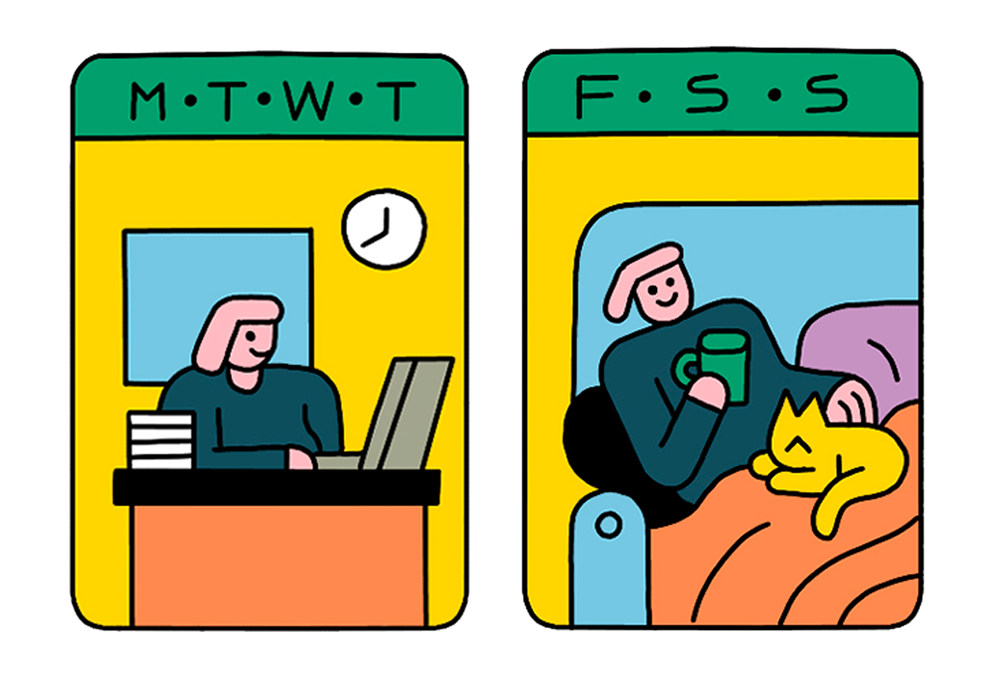How Workplaces Can Give Staff Unlimited Paid Time Off

During the pandemic, Miovision introduced paid “Mio-days,” an extra day off work on top of every three-day long weekend. This means that the company, which is based in Kitchener, Ont., and creates tech that helps cities track and analyze traffic data, gives staff up to 10 additional days off per year.
And that’s on top of Miovision’s progressive vacation policy: In 2016, it instituted unlimited paid time off for staff, which Jill Jutzi, VP of people and culture, says is a reflection of the company’s core value of empowering team members. “It not only helps keep our workforce happy and motivated but also gives us an edge in attracting and retaining talent,” she says. Employees must take at least three weeks off each year, but there’s no maximum amount.
RELATED: Would You Tell Your Boss How You Really Feel About Work? That’s the Point of ‘Stay Interviews’
That may sound like a recipe for chaos, but Jutzi says it has yet to hamper productivity. Average vacation time hovers around three to four weeks, and if anything, the policy has been a win-win for the company and its workforce. “We need strong performers who feel energized at work,” Jutzi says. “If you’re not taking time to recharge your batteries, you’re not going to perform well at your job. We trust our employees, so we give them the latitude to decide how much time off they need.”
Logistically, the vacation policy is simple. Most requests for time off go through an automated system; Miovision uses the payroll software ADP. Requests for longer than a month must be approved by a manager. Behind the policy’s success are two pillars: hiring the right people and measuring performance by impact, not hours at work. Jutzi says hiring managers focus on finding team players who align with Miovision’s values: Complacency is not an option; put the customer first; have a passion for success; and value individuals.

In the recruitment process, they ask open-ended questions like like “Tell me about a time when you overcame a series of roadblocks in a project,” to assess a candidate’s alignment with these values. “We’re looking for answers that talk about the importance of mutual respect as well as clear communication and—when things don’t go as planned—solutions-focused conversations,” Jutzi says.
But how do you measure performance without centring time spent at work? The key is a proactive system for managing goals. Miovision distills broader, company-wide targets into concrete quarterly deliverables, which then get broken down into objectives for specific teams and team members. At the beginning of each quarter, employees work with their managers to establish a list of goals, and they have regular discussions to track progress—generally with a biweekly one-on-one. “The aim is for both employee and manager to be clear on deliverables—there shouldn’t be any surprises regarding performance,” Jutzi says.
The company has never had to discipline an employee for taking too much paid time off. If that did happen, Jutzi says it would be triggered not by how much time a person has been away but by them not fulfilling their responsibilities. “At Miovision, it really is about the work, not the time off,” she says. “That attitude definitely gives us an edge in recruitment. The tech market is competitive, and you want to be able to offer policies that allow people to have a life alongside their job.”
For businesses looking to give employees unlimited paid time off, Jutzi says it’s crucial to think about it as an extension of the broader company culture. Introducing a liberal vacation policy is a clear way to demonstrate trust for one’s employees—and a way for leaders to walk the proverbial talk when it comes to empowering their workforce.
This article appears in print in the Spring 2023 issue of Canadian Business magazine. Buy the issue for $7.99 or better yet, subscribe to the quarterly print magazine for just $40 a year.










